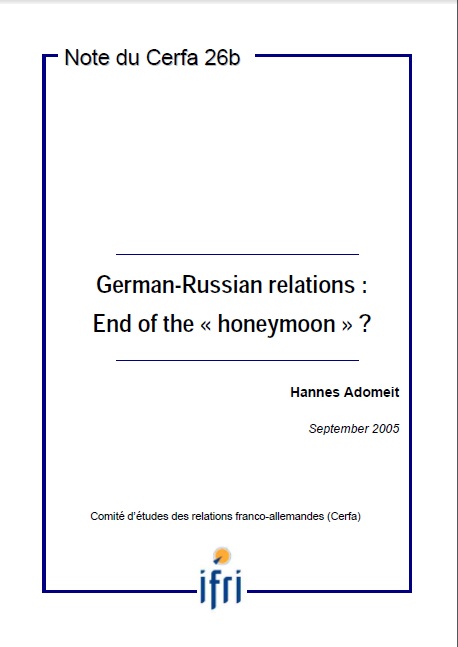German-Russian relations : End of the "honeymoon"?

The developments in Putin’s Russia away from democracy and the constitutional state have also placed Germany’s policy on Russia under scrutiny. In the run-up to the election to the Bundestag on September 18th, representatives of the opposition parties CDU/CSU and FDP have thus made it clear that they no longer approve of the policy Chancellor Schröder has adopted with regard to Russia. The new EU member states in Eastern and Central Europe are accusing Germany of pursuing a Sonderweg compared with the rest of the EU and attempting to build a special relationship with Russia. This article addresses the question of whether this criticism is justified, and what is behind the “strategic partnership” that Chancellor Schröder and President Putin have attested to time and again.
Hannes Adomeit has been a Senior Research Fellow at the Stiftung Wissenschaft und Politik (SWP) in Berlin since 1997, specializing in Russian issues.

Available in:
Regions and themes
Share
Download the full analysis
This page contains only a summary of our work. If you would like to have access to all the information from our research on the subject, you can download the full version in PDF format.
German-Russian relations : End of the "honeymoon"?
Related centers and programs
Discover our other research centers and programsFind out more
Discover all our analysesThe Franco-German Brigade and the Revival of European Defense
One thing has been clear since Donald Trump's return to the White House: the very existence of the European unification project is threatened. Unless it develops a sovereign defense policy to counter the war in Ukraine and the weakening of American security guarantees, the European Union will continue to see its internal cohesion and external attractiveness wane.
Friedrich Merz and the Zeitenwende 2.0. A “New Era” for Transatlantic Relations?
On February 23, 2025, almost 60 million voters were called upon to elect a new Bundestag. These elections will also give rise to a new government in Europe's largest economy.
After the Elections: Germany in Search of Shaken Stability?
With a voter turnout of 82.5%, Germany recorded its highest participation since 1987—an increase of 6.1 percentage points compared to 2021. As in the previous election, the high turnout particularly benefited the Alternative for Germany (AfD), which was able to mobilize many former non-voters. Many voters sought to punish the outgoing government with their ballots, as its approval rating had dropped to just 14% before the coalition broke apart in November 2024. Germany is now very likely heading toward a grand coalition between the CDU/CSU and the SPD, with exploratory talks having begun on February 28.
The German Greens as an Alliance Party: The End of an Illusion?
At the Wiesbaden Congress in November 2024, Robert Habeck, currently Minister for the Economy and Climate, was nominated as the Green Party’s candidate for the Chancellorship in the early parliamentary elections on February 23, 2025. The party, founded 45 years ago, is now firmly established in the German political landscape. Wishing to turn the page on an unloved ‘‘traffic light’’ coalition, the party is banking on a personal campaign and an optimistic discourse based on the energy transition and social justice.








